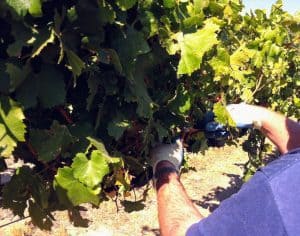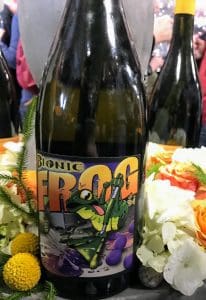A few days after Christmas, the South African Twitter account @WineMag decided to resurrect the ghost of controversies past by revisiting Jon Bonné’s provocative article Why Is the Wine World So Un-Woke?.

Written in the aftermath of Anthony Bourdain’s suicide last summer, Bonné wondered why we didn’t have more writers who embraced Bourdain’s willingness to “tear down the false romanticism” around wine. Instead, wine writers seem to actively avoid covering sensitive topics or the industry’s unsavory elements.
Food, and food writing, may be guilty of its share of glossing-over, of preening and celebrity and the lionizing of malcontent, egoist chefs—not even at the Batali-Friedman-Besh level, but more subtly. It’s no different with tech, where Steve Jobs’ iconic status could overshadow the fact he wasn’t a terribly nice person. But when it comes to whistling past its problems, wine asks those other industries to hold its beer. Jon Bonné, PUNCH magazine, July 18th, 2018
Bonné certainly garnered a lot of attention (and interesting comments) when his post was originally published. But then, like many things in our ADD-driven culture, it faded from the conversation. At least it did until the December 27th tweet from @WineMag. That piqued the interest of Master of Wine Tim Atkins who retweeted it on his feed.
Then Whoa Nelly!
While I’ll comment on a few things below, I can’t possibly do justice summarizing all the many excellent points and divergent opinions in the thread, as well as the many side threads, that sprung up from Atkins tweet. Instead, I’ll encourage you to take a trip down the rabbit hole to read the insightful comments from Atkins, Artisan Swiss, Felicity Carter (the Editor-in-Chief of Meininger’s Wine Business International), Master of Wines John Atkinson and Elizabeth Gabay, Petri Pellinen as well as Bonné himself.
While Bonné’s original post wasn’t explicitly about wine & politics, several of the threads converged on the question about how “political” should we expect wine writers to be. Things took a particularly charged turn when Maureen Downey, probably the wine world’s foremost expert on wine fraud, shared her stark disagreement that politics and wine should ever mix.
Sweet Baby Jesus-please keep SJW ideology out of wine writing! Cover product, people, place, history, production, quality…but not politics. FFS can’t we have anything to just enjoy? Wine is controversial enough w/out piling on more. ESP for those of us who aren’t socialists.
— Maureen Downey (@moevino) December 28, 2018
This set off another cascade of replies and threads–including one where I finally poked my head. My tweet came in response to Felicity Carter’s comment that wondered if American and European folks were looking at Bonné’s article from different angles.
American here. I sympathize a lot w/ @moevino view. I’m very political but deliberately keep two Twitter accounts so I can keep my wine POV separate from politics. Wine is also my refuge when my head and heart gets weary over all the crap going on in the world. Hate to lose that
— Amber @ SpitBucket.net (@SpitbucketBlog) January 2, 2019
Why Go Red or Blue When You Can Go Rosé?
As I learned later, through a series of tweets by Jon Bonné, my political views and Maureen Downey’s are very different. I’m a moderate who disdains tribalism that puts people into red/blue, liberal/conservative camps. I personally don’t believe that any ideology has a monopoly on good ideas (or bad ones) which is why we should listen to each other and compromise.
While the vitriol of Downey’s political posts disheartened me, they still don’t sway my overall respect for her work. I feel it would be foolish to shun her expertize or boycott her company just because our beliefs outside of wine are so different.
But I fear that such a public outing of personal politics (even if they’re made in a public forum) would cause others to rethink their esteem of Downey. And that disheartens me just as much as Downey’s politics.
Simply put, I don’t want to lose the “safe space” of a wine community. I love that people from diverse backgrounds and beliefs can set aside their differences and share a common joy. Losing this sense of community is exactly what we’re risking when wine writers dive too much into politics.
Exceptions not Expectations
However, I don’t believe that the world of wine needs to avoid politics completely. I do somewhat agree with Bonné yearning for a Bourdain-type figure in wine. We do need writers who aren’t afraid of poking sacred cows or exposing the ugly side of the industry.
But I think those people, like Bourdain, are rare breeds. I shared this sentiment in a further reply on Carter’s thread.
BUT, Wine is part of culture & doesn’t exist in a vacuum. I appreciate that there will be some writers moved to speak out when they see social ills & wine intersect–and produce great work. I just hope those writers are the exceptions rather than the expectations of wine writing
— Amber @ SpitBucket.net (@SpitbucketBlog) January 2, 2019
It would benefit no one if wine writers were judged by how “woke” they were and how actively they covered political topics. Not everyone has the skills set (or tact) to tackle those issues in ways that move the conversation forward instead of disintegrating into pontification and invectives.
Those that have those skills should be valued and encouraged to write when they’re inspired. But for the vast many who don’t, their dabbling into political tussles is more apt to produce a landscape of replacing facts with opinions and emotionally charged slurs of SJW, liberals, right-wingers or conservatives slung about.
And where does that help? It certainly doesn’t help enhance the appreciation of wine. Nor would it edify anyone’s understanding of sensitive political issues.
Maybe We Need More Esther Mobleys Rather Than Anthony Bourdains?
If you want an example of a wine writer that has the skills and tact to write effectively about politically charged issues go check out Esther Mobley of the San Francisco Chronicle. Over the years, she has tackled some thorny subjects like the role of immigrant labor in sustaining the California wine industry and gender issues.
While you might be able to infer Mobley’s politics by her topic choices, you would be hard-pressed to peg her exact personal views down. That is because her work rarely speaks to her opinion. Instead, the scalpel she uses to cut deep into her topics speaks loudly enough for her. Sure, she’s not as blunt as Bourdain was in calling out perceived ills. But her thoughtful approach moves these delicate conversations forward.
That makes her far more effective as a wine writer than a wannabe Bourdain being a bull in the china shop.
If there were more Esther Mobleys writing about wine, I wouldn’t feel as cringey about the thought of wine writers being political. But just like Anthony Bourdain, Esther Mobley is a rare breed as well.
Not many can fill those shoes. I know I can’t. Which is why I’ll continue to keep my two Twitter accounts separate.





